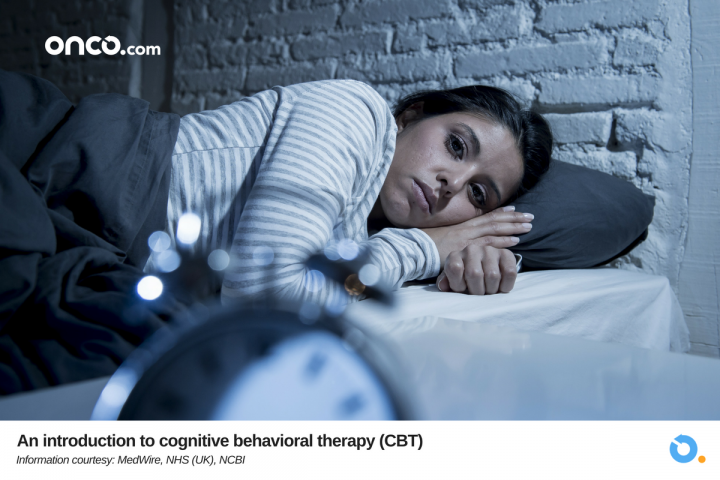Learn how cancer patients and survivors can sleep better.
According to National Cancer Institute, as many as half of cancer patients can suffer from sleeping disorders[1]. There are multiple causes for this including certain tumors, cancer treatment drugs, time in hospital and the emotional stress that patients undergo. In such cases, CBT (or cognitive behavioral therapy) is a great way to improve sleep patterns.
 What is cognitive behavioral therapy?
What is cognitive behavioral therapy?
Cognitive behavioral therapy (also called CBT) is a non-pharmacological line of treatment that includes both cognitive and behavior-change techniques, in order to target and improve a patient’s dysfunctional attitude, their levels of optimism, and their sleep patterns. It is a form of psychotherapeutic treatment[2], which focuses on how our thoughts affect our overall mood, or emotional state of mind.
Throughout history, this type of therapy has been used to treat many psychological disorders. In recent times, it has proven useful[3] for treating pain associated with cancer, different types of cancer treatment, and their overall psychological burden.
How effective is CBT for cancer patients?
Previously, cancer patients troubled by insomnia were treated with therapies such as acupuncture. But recently, trial results have shown us that CBT-I (or cognitive behavioral therapy for insomnia) is much more effective than acupuncture specifically for reducing the severity of sleeplessness that is commonly seen in cancer patients.
In one such trial [4], 160 cancer patients were identified and recruited, whose first cancer diagnosis had happened at least 6 years back, and all of whom had completed their suggested line of treatments. All of these patients were affected with insomnia, ranging from mild to severe levels. Some patients were treated with CBT-I, and some received traditional acupuncture therapy. In order to eliminate any bias from this process, the patients were randomly selected to receive one or the other treatment.
This trial involved the use of the following CBT-I treatment protocols:
- Sleep restriction: This protocol aims to control the time spent in bed to match the exact time spent sleeping, and aims to increase the quality of sleep by extending sleep time.
- Stimulus control: These are situations in which a particular behavior is triggered by the presence or absence of specific stimulus. For example, if you practice eating when you watch TV, you will eventually feel hungry every time you switch on the TV.
- Cognitive restructuring: This is a psychotherapeutic process that allows patients to identify and dispute irrational or maladaptive thoughts such as all-or-nothing thinking (splitting), over-generalization, problem magnification, and emotional reasoning by re-calibrating their emotional response to specific objects/situations.
- Relaxation training & education: This includes all methods and activities which can help a person relax or attain a state of increased calmness, and reduce the levels of pain, anxiety, stress or anger in general. This is achieved via practices such as guided meditation, listening to calming music, etc.
Results from the trial
Improvements in ISI (Insomnia Serverity Index)
After the trial duration, the average insomnia severity index, or ISI[5] for the control group that received CBT-I fell from 18.5 to 7.5 points, showing a 10.9 point improvement over the baseline. In the acupuncture control group, this difference was 8.3 points over the baseline.
CBT-I fared 35% better as compared to acupuncture, which is considered a significant difference by oncologists.
Note: ISI, or Insomnia Severity Index, is calculated based on personal responses to a standardized survey. You can check out a sample survey[6] sheet to understand this better.
Improvements in average response rate
Apart from the improved scores, mildly insomniac cancer patients also demonstrated a significantly higher rate of response to CBT-I as compared to acupuncture.
At the end of an eight-week mark in the trial, patients with mild insomnia who underwent CBT-I showed an average of 85% response rate. In contrast, the average response rate for acupuncture was 18%.
The improvements seen in these trials (for both acupuncture and CBT control groups) were seen to be sustained during the entire 20-week trial period. In addition to this landmark trial, there have been other, more targeted trials[7] that have clearly indicated that cognitive behavioral therapy is a clear winner for treating insomnia in cancer survivors.
“While both acupuncture and CBT-I resulted in clinically meaningful and durable effects among cancer survivors with insomnia, CBT-I was more effective, especially among patients with mild insomnia symptoms. Patients and oncology clinicians can use these findings to inform their choice of insomnia treatment.”
-Jun Mao (presenting author for the trial, Memorial Sloan Kettering Cancer Center, New York, USA)
- NCI – https://www.cancer.gov/about-cancer/treatment/side-effects/sleep-disorders-pdq#section/_3 ↩︎
- NCBI/CBT-for-cancer-patients – https://www.ncbi.nlm.nih.gov/pmc/articles/PMC4577033/ ↩︎
- NHS-UK – https://www.nhs.uk/conditions/cognitive-behavioural-therapy-cbt/ ↩︎
- ResearchGate/Sleeping-well-with-cancer-CBT – https://www.researchgate.net/publication/263515789_Sleeping_well_with_cancer_A_systematic_review_of_cognitive_behavioral_therapy_for_insomnia_in_cancer_patients ↩︎
- NCBI-Pubmed/Insomnia-Severity-Index – https://www.ncbi.nlm.nih.gov/pmc/articles/PMC3079939/ ↩︎
- Sample-ISI-Survey-Sheet – https://www.ons.org/sites/default/files/InsomniaSeverityIndex_ISI.pdf ↩︎
- NCBI-PubMed/Breast-cancer-CBT-relief – https://www.ncbi.nlm.nih.gov/pubmed/16400532 ↩︎


